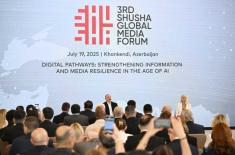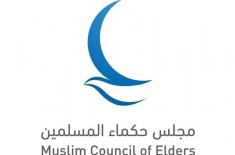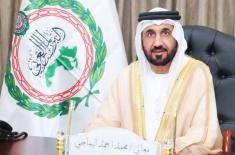
Youth Demand 25pc Climate Funding At Provincial Consultation In Dera Ismail Khan
Faizan Hashmi Published July 20, 2025 | 12:50 PM

DERA ISMAIL KHAN, (UrduPoint / Pakistan Point News - 20th Jul, 2025) Youth leaders and climate activists have urged the government to allocate 25 percent of climate funding to youth-focused initiatives, emphasizing the critical role of young people in shaping climate action. The demand was made during a Provincial Youth Consultation for Policy and Climate Action, organized by youth development organization Bargad in collaboration with the British Council here Sunday.
The consultation, attended by over 100 participants including youth leaders, climate activists, academics and government officials, highlighted the need for inclusive, practical, and localized climate responses. Key youth recommendations included promoting climate education, creating digital platforms, establishing university climate clubs, initiating urban and agro-forestry projects, and forming district-level youth platforms.
Distinguished speakers included Iqbal Haider Butt, a leading youth development expert and CEO of Youthtube, Sahar Sohail, PhD Scholar in Environmental Sciences and Chief Organiser of the Youth Consultation, Dr. Fazal ur Rehman (PRO to the Governor Khyber Pakhtunkhwa), Imran Khan from the Agriculture Department, Prof. Dr. Rubina Naz, former Dean of Sciences at Gomal University, Dr. Sadaf Javeria, Associate Professor and climate expert from Gomal University, Dr. Shahbaz Israr Khan of Médecins Sans Frontières, Dr. Muhammad Adeel, Khurram Iqbal, Aamir Sohail Saduzai President SAHARA Organization, Amir Hameed Mughal, Rameen Mashhood and Khadija Naeem members Prime Minister’s National Youth Council . Climate champions Ayub Badshah and Sheharyar Khan from PYLI also shared insights.
While talking to APP, Sabiha Shaheen, Executive Director of BARGAD, reaffirmed the organization’s dedication to youth-driven, inclusive policymaking. She noted, “Young people are not merely the leaders of tomorrow — they are already driving meaningful change today. This consultation creates space for voices from marginalized and climate-affected communities to actively influence national conversations and policies. Youth participation must go beyond symbolism; it needs to be genuinely embedded within decision-making structures.”
During the consultation session, Iqbal Haider Butt, a prominent youth development expert and CEO of Youthtube emphasized the importance of youth-led spaces in shaping climate policy. He highlighted that the initiative is designed to amplify grassroots voices and ensure that young people are not just heard, but actively involved in crafting local climate solutions.
“This consultation isn’t just about raising concerns — it’s about jointly developing practical, community-based policies that reflect on-the-ground experiences,” he stated.
Iqbal Haider Butt further stressed the need to institutionalize youth participation in long-term climate strategies. “Young people have the drive and innovative thinking to lead change. What they need is ongoing support, recognition, and access to platforms where real decisions are made,” he added.
The event included dynamic group sessions focused on nine critical themes, with particular emphasis on youth leadership and community-based resilience strategies. Engaging activities like the “Climate Word Wall” and “Youth Policy Wall” encouraged participants to voice their concerns and contribute concrete policy suggestions aimed at tackling climate challenges.
As part of the event, BARGAD unveiled its Identification Study — a strategic initiative designed to bridge the gap between young people and climate governance in Pakistan. The study seeks to map out how youth can access relevant policies, engage with institutions, and tap into opportunities that empower them to play an active role in climate action at both local and national levels.
Dr. Sahar Sohail, PhD scholar in Environmental Sciences and the chief organiser of the Youth Consultation, underscored the critical need to move from dialogue to actionable outcomes. She pointed out that young people across the country are already tackling climate issues through grassroots initiatives, but their efforts often go unnoticed in formal policy processes.
“This platform is about turning youth-driven climate efforts into policy influence,” she said. “Our aim is to connect real-world climate action by young people with the systems and institutions that shape national responses. It’s time to shift from isolated efforts to structured, scalable impact.”
Muhammad Fazal Rehman, Public Relations Officer to the Governor of Khyber Pakhtunkhwa, emphasized the value of youth-led consultation forums in shaping climate response strategies. He noted that the event serves as a strong example of how meaningful collaboration between young people, academic institutions, and government bodies can lead to practical, locally-informed climate solutions.
“This kind of engagement sets a precedent for inclusive policy development,” he remarked. “It’s essential that the insights and recommendations generated here are integrated into national planning frameworks to ensure lasting impact.”
Experts at the event emphasized the need to equip young people with climate education, financial support, and leadership opportunities. “Youth are already developing innovative solutions to climate challenges,” one expert noted. “What’s needed now are systems that can scale these ideas, replicate them across regions, and integrate them into formal policy frameworks.”
Participants strongly emphasized the importance of meaningful and locally grounded youth engagement in climate policy. Rija Zahra Zaidi, a passionate young climate advocate, stressed that youth participation must go beyond token gestures. “We need to be actively involved in designing, implementing, and monitoring climate strategies,” she said.
Echoing this sentiment, Ehtasham Baraqzai highlighted the diverse climate challenges across different regions of Pakistan. “Every area experiences climate change differently — and local youth are best positioned to develop solutions that reflect their communities' specific needs,” he noted.
Youth leaders and climate activists at the consultation collectively called on the government to allocate at least 25% of national climate funding to youth-led and youth-focused initiatives. They stressed that empowering young people with resources and authority is essential to advancing effective, sustainable climate action across the country.
During a compelling plenary session, young participants recounted firsthand experiences of water shortages, devastating floods, and rising temperatures in their communities. Their stories highlighted the urgent need for climate strategies that prioritize inclusion and address the vulnerabilities of marginalized populations. The youth called on policymakers to ensure that future climate policies reflect the lived realities of those most affected.
The consultation in Dera Ismail Khan is part of a larger national effort under the Pakistan Youth Leadership Initiative (PYLI). This initiative focuses on building youth capacity, fostering meaningful policy engagement, and identifying practical strategies to strengthen climate resilience. Similar youth consultations are scheduled to take place in the remaining three provinces in the coming months.
The consultation wrapped up with a certificate distribution ceremony, symbolizing recognition of the participants’ contributions. The event concluded on a unified note, as youth leaders and stakeholders pledged to continue driving youth-led climate action across the country.
Recent Stories

37 confirmed dead in cruise ship accident in N. Vietnam

Israeli airstrikes, acute malnutrition kill 7 Palestinians in Gaza

GCC-Stat: 262.7 million tons of waste collected, 192.0 million tons treated acro ..

Voting begins for Japan's Upper House election

Ten killed, nine missing in heavy rains, landslides across South Korea

Currency Rate In Pakistan - Dollar, Euro, Pound, Riyal Rates On 20 July 2025

Today Gold Rate in Pakistan 20 July 2025

Liwa Dates Festival attracts over 50,000 visitors in 5 days

Azerbaijani President meets participants of Shusha Global Media Forum

UAE welcomes Declaration of Principles between DR Congo, Congo River Alliance, c ..

Muslim Council of Elders strongly condemns Israeli attack on Holy Family Church ..

Arab Parliament condemns Israeli escalation, attacks on places of worship
More Stories From Pakistan
-
Around 336,999 Pakistanis proceed to abroad for employment during Jan 1 to June 30 this year; Minist ..
5 minutes ago -
Youth demand 25pc climate funding at provincial consultation in Dera Ismail Khan
5 minutes ago -
CM Sindh grieves over loss of lives in Makli bus accident
15 minutes ago -
ITP issues traffic plan for 24th Muharram procession
1 hour ago -
1 dead, several injured in Khairpur bus overturn on National Highway
2 hours ago -
Bus carrying tourists to Keenjhar Lake overturns near Thatta Bypass, six killed
3 hours ago
-
Kashmiris’ indigenous struggle a legitimate quest for freedom: Hurriyat leaders
3 hours ago -
Mechanized farming inevitable to boost agriculture yield: Rana Tanveer
13 hours ago -
Amir Muqam criticizes KP govt. over governance, corruption
13 hours ago -
PTI's protest campaign lacks public support: Barrister Aqeel
13 hours ago -
Senate election strategy finalized by opposition, says KP governor
13 hours ago -
Partly cloudy weather forecast
14 hours ago